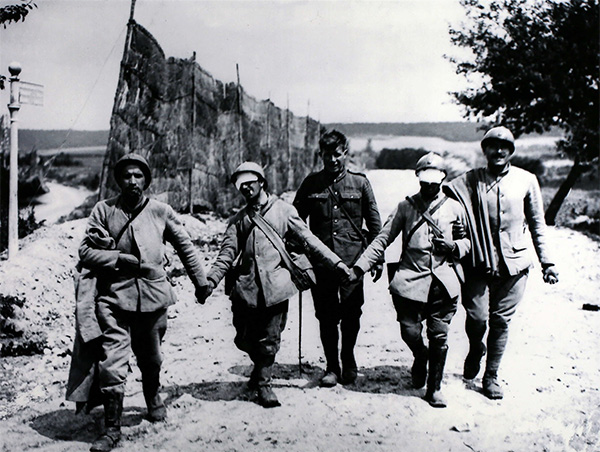World War I resulted in huge losses of life with an estimated 10 million military deaths and another 20 million injured. Cenotaphs remember nearly a million British soldiers who died in World War One and more than twice as many were injured — however, the plight of the wounded and the work of the medics and carers are not often spoken about.
Shining a light on this is a new book called ‘Wounded’, by medical historian, Emily Mayhew, which tells the heart-wrenching story of the injured and their carers in The Great War. Many men sustained permanent, life-changing injuries from these new, powerful 20th Century weapons of warfare and soldiers suffered terrible injuries in battle, enduring grim and unsanitary conditions in trenches. New weapons brought new horrors including gas from July 1916. Soldiers arrived at casualty stations and field hospitals with wounds from the fast bullets of rifles and machine guns, which often hit deep. Shrapnel fragments from shells often created jagged wounds that bled constantly and provided the ideal environment for infection. Stretcher-bearers and nurses witnessed first hand the nightmare that some soldiers were living — they contributed massively in the aid of soldiers and it seems mad that they didn’t even get a mention in the official histories of war.
Not a job for the weak of stomach
In the trenches they lined up behind those soldiers going over the top into action, then calmly followed to pick up the pieces. Not a job for the weak of stomach. Apparently one bearer wrote: “it was one thing to do gallant deeds with arms in hand and when the blood is up, but courage of a different order to walk quietly into a hail of lead to bandage and carry away a wounded man”. In the dark, stretcher-bearers would crawl from shell-hole to shell-hole after an attack in no-man’s-land to find the wounded, then they would dodge bullets as they made their journey back to the safety of their lines with the dead weight of a grown man on their backs. They didn’t do this once or twice: they went back; again and again. “We are always under fire and can’t dump our stretcher and run for a safe spot,” one wrote in his diary. “We have to plod on.” It was harrowing work; war in its rawest form. Bearers learned more about death than any other men on the battlefield, says historian, Mayhew.
They learned to judge instantly who was dead and who still alive, and to turn away from the desperate dying to concentrate on those with a better chance of survival. They learned to watch men die, and even how to help them out of this world with a last cigarette or a few blue morphine tablets. The worst of the job was carrying back a casualty who was dead on arrival, or one whom the surgeons then decided was a hopeless case. Bearers learned more about death than any other men on the battlefield, says Mayhew.
Those that made the journey to the hands of doctors and nurses of the field hospitals behind the lines weren’t out of the woods either and the hospitals — some in tents, others in requisitioned buildings — were squalid and over-stretched. The medics and carers did their best in impossible conditions, nurses like the one detailed in the Mayhew’s book (Nurse Winifred Kenyon) needed a plentiful supply of handkerchiefs — for the soldiers who woke from surgery to learn that their legs had been amputated, or caught sight for the first time of an empty pyjama sleeve where an arm had been. Broken men cried in the nurses’ arms until their aprons were soaked.
Just breathing, gasping and the occasional rasp of a match lighting a cigarette… The book details how an experienced doctor, John Hayward, was himself in shock the first time he handled casualties straight from the battlefield. Struck by how quiet and resigned the men waiting for treatment were — he states there was no groaning, just breathing, gasping and the occasional rasp of a match lighting a cigarette.
What troubled him most was having to choose which patient to operate on — who to save and who to let die. Doctor Hayward remembers the horror of gas, cleaning, washing, bandaging, mopping up the effects of this new so-called ‘breakthrough in modern weaponry’. Gas blinded soldiers and choked their lungs and the gas clinging to their uniforms was so potent still that volunteers fainted and flowers bought by well-wishers to welcome the wounded men home turned black and died. For the seriously wounded – those beyond being patched up and sent back to the Front – repatriation was the next step, in ambulance trains to the Channel ports and then by ship. At railheads soldiers waited in lines of blankets and stretchers along the platform — waiting for their train to Blighty as trains going in the opposite direction were full of fresh recruits heading towards the Front… The sight of bloodshed, injured soldiers and ambulance trains must have terrified those new reinforcements heading into battle.
We must never forget the fallen, injured or those who aided our soldiers in battle. How will you remember your military ancestors and those who have fought for our country this Remembrance Day?
Source: Daily Mail


